| Srl | Item |
| 1 |
ID:
085353
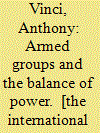

|
|
|
|
|
| Publication |
London, Routledge, 2009.
|
| Description |
x,167p.
|
| Standard Number |
9780415466226
|
|
|
|
|
|
|
|
|
|
|
|
Copies: C:1/I:0,R:0,Q:0
Circulation
| Accession# | Call# | Current Location | Status | Policy | Location |
| 054007 | 327.112/VIN 054007 | Main | On Shelf | General | |
|
|
|
|
| 2 |
ID:
106959
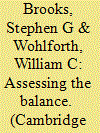

|
|
|
|
|
| Publication |
2011.
|
| Summary/Abstract |
Save for the single issue of balance of power theory's relevance to the current system, where we and some of our critics are in real disagreement (and they are wrong), every aspect of this symposium has been highly productive. Our critics do not directly dispute the proposition that a rapid end of a single superpower world is extremely unlikely. They generally endorsed our core finding that the systemic constraints featured in IR scholarship are largely inoperative with respect to a United States that remains the sole superpower. These essays are consequently devoted mainly to discussing the implications of our findings and the future research agenda. In particular, they developed serious challenges to the idea of US led institutional revisionism, generated new ideas about both systemic and non-systemic constraints, and suggested potentially powerful theories about constraints on other states besides the United States.
|
|
|
|
|
|
|
|
|
|
|
|
|
|
|
|
| 3 |
ID:
130287
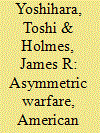

|
|
|
| 4 |
ID:
098715


|
|
|
| 5 |
ID:
113665
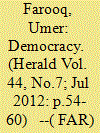

|
|
|
| 6 |
ID:
034283
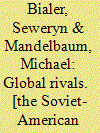

|
|
|
|
|
| Publication |
London, I.B.Tauris, 1989.
|
| Description |
xi, 210p.
|
| Standard Number |
1850431264
|
|
|
|
|
|
|
|
|
|
|
|
Copies: C:1/I:0,R:0,Q:0
Circulation
| Accession# | Call# | Current Location | Status | Policy | Location |
| 030941 | 327.47073/BIA 030941 | Main | On Shelf | General | |
|
|
|
|
| 7 |
ID:
151233
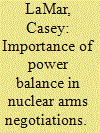

|
|
|
|
|
| Summary/Abstract |
Theorists debate whether symmetry or asymmetry of the power balance can help bring about bargaining success. Arbitration is difficult because the ‘Symmetry Theory’ accepts Structuralist theoretical conventions, while the ‘Asymmetry Theory’ rejects such conventions. This article employs a ‘Nuclear Weapons Addendum’ to strengthen the Asymmetry Theory by allowing it to explain bargaining results in symmetric and asymmetric cases without dismissing Structuralist assumptions. We analyze comparative case studies of the Cuban Missile Crisis and the Intermediate-Range Nuclear Forces Treaty to argue that this modified Asymmetry Theory provides a more convincing narrative that should be considered in Structuralist discussions of international negotiation.
|
|
|
|
|
|
|
|
|
|
|
|
|
|
|
|
| 8 |
ID:
100625
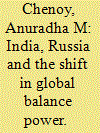

|
|
|
| 9 |
ID:
117522
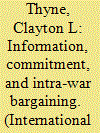

|
|
|
|
|
| Publication |
2012.
|
| Summary/Abstract |
This article considers how governmental variations affect the duration of civil conflicts. Recent work suggests that war termination is likely when competing actors gain information about the power balance and are able to credibly commit to war-ending agreements. I focus on how the strength and stability of executives impact these factors. Regarding information, power consolidation within the government reduces the number of people who must agree on a settlement, which should shorten civil conflicts. Stable leadership should likewise shorten conflicts by making it harder for potential spoilers to derail war-ending agreements, helping minimize credibility problems. This argument is tested by examining how variations in institutional design (executive constitutional and legislative power), political strength (ideological fragmentation and polarization), and stability (leadership tenure) affect the duration of civil conflicts from 1946 to 2004. The results suggest that powerful and stable executives are indeed well equipped to end civil conflicts.
|
|
|
|
|
|
|
|
|
|
|
|
|
|
|
|
| 10 |
ID:
130271
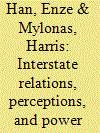

|
|
|
|
|
| Publication |
2014.
|
| Summary/Abstract |
Why do multi-ethnic states treat various ethnic groups differently? How do ethnic groups respond to these state policies? We argue that interstate relations and ethnic group perceptions about the relative strength of competing states are important-but neglected-factors in accounting for the variation in state-ethnic group relations. In particular, whether an ethnic group is perceived as having an external patron matters a great deal for the host state's treatment of the group. If the external patron of the ethnic group is an enemy of the host state, then repression is likely. If it is an ally, then accommodation ensues. Given the existence of an external patron, an ethnic group's response to a host state's policies depends on the perceptions about the relative strength of the external patron vis-à-vis the host state and whether the support is originating from an enemy or an ally of the host state. We present five configurations and illustrate our theoretical framework on the eighteen largest ethnic groups in China from 1949 to 1965, tracing the Chinese government's policies toward these groups, and examine how each group responded to these various nation-building policies.
|
|
|
|
|
|
|
|
|
|
|
|
|
|
|
|
| 11 |
ID:
133638
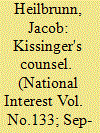

|
|
|
|
|
| Publication |
2014.
|
| Summary/Abstract |
In his new book World Order, the former Secretary of State offers a sweeping guide to the rise of the modern state system, and warns that a stable balance of power remains as crucial now as in the era of Westphalia.
WHEN HENRY KISSINGER celebrated his ninetieth birthday in Manhattan's St. Regis Hotel in June 2013, he attracted an audience of notables, including Bill and Hillary Clinton, John Kerry, Valery Giscard D'Estaing, Donald Rumsfeld, James Baker and George Shultz. Kerry called Kissinger America's "indispensable statesman," but it was John McCain who, as the Daily Beast reported, electrified the room with his remarks. McCain, who was brutally tortured in what was sardonically known as the Hanoi Hilton, earned widespread respect for courageously refusing to accept an early release from his Vietnamese captors after his father had been promoted to commander of the U.S. Pacific Fleet.
|
|
|
|
|
|
|
|
|
|
|
|
|
|
|
|
| 12 |
ID:
038857
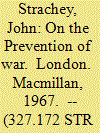

|
|
|
|
|
| Publication |
London, Macmillan, 1967.
|
| Description |
ix, 334p.
|
|
|
|
|
|
|
|
|
|
|
|
Copies: C:1/I:0,R:0,Q:0
Circulation
| Accession# | Call# | Current Location | Status | Policy | Location |
| 003784 | 327.172/STR 003784 | Main | On Shelf | General | |
|
|
|
|
| 13 |
ID:
115535
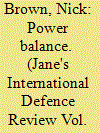

|
|
|
| 14 |
ID:
098979
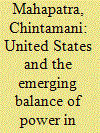

|
|
|
| 15 |
ID:
186166
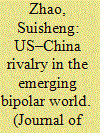

|
|
|
|
|
| Summary/Abstract |
This article argues that although the US–China rivalry has not presented with some essential elements of the US–Soviet Cold War, the emerging bipolarity has led to misplaced ideological hostility and repeated failling attempts of building alliance systems. Delicate power balance between the two countries has further complicated the rivalry by giving each side the false conviction to prevail.
|
|
|
|
|
|
|
|
|
|
|
|
|
|
|
|
| 16 |
ID:
104635
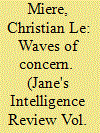

|
|
|